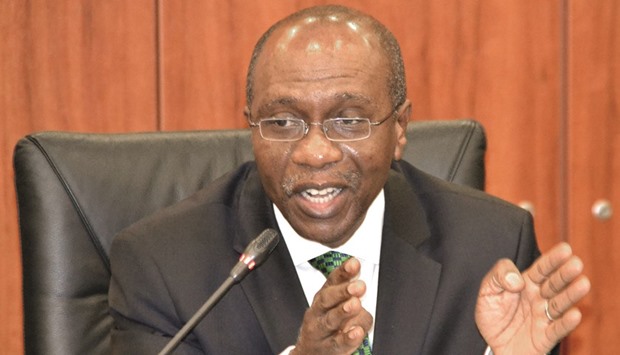Central Bank of Nigeria Governor Godwin Emefiele has dashed hopes for a devaluation of the naira any time soon, forward contracts show.
While the non-deliverable forwards, or NDFs, are still pricing in a devaluation against the dollar of as much as 40% over the next 12 months, three-month contracts have moved from predicting depreciation of 25% in mid-February to just 10% after Emefiele pledged on March 22 to maintain “currency stability”.
With the backing of President Muhammadu Buhari, the central bank has effectively pegged the naira at 197 to 199 per dollar since last year through capital controls and import restrictions. It is trading at about 320 per dollar on the black market. Nigeria’s currency policy, which has deterred foreign investment in Africa’s biggest oil producer and caused a dollar shortage that’s hurting businesses, would be “very insane” if it continues, Unilever’s Africa President Bruno Witvoet said in a March 21 interview.
Three-month NDFs have appreciated 13% in the past month to the strongest level since December, and are now trading at 220, compared with a spot rate of 199 naira per dollar. Contracts expiring in 12 months are trading at 279, or 40% weaker than the spot rate, suggesting that a depreciation is inevitable in the longer term.
“That’s exactly what the disconnect between the short and long end of the NDF curve highlights,” Samir Gadio, head of Africa strategy at Standard Chartered Bank Plc in London, said by phone. “The market doesn’t expect any currency adjustment in the short term,” he said, though “weak oil prices and weak fundamentals eventually will lead to some sort of exchange-rate adjustment.”
The Monetary Policy Committee unexpectedly increased the benchmark rate by 100 basis points to 12% on March 22, concerned by the rapid acceleration in inflation. While acknowledging that a dollar shortage is hurting businesses, Emefiele complained that banks aren’t extending enough credit to investors to spur growth. The economy expanded 2.8% in 2015, according to the statistics office, the slowest pace since 1999.
Three-month NDFs gained 0.9% after the MPC announcement as traders pared bets on a currency devaluation. The price difference between three-month and 12-month contracts has widened to 59.5 naira per dollar, from as low as 25.5 in mid-January. The naira declined 0.1% to 199.15 last week in Lagos, the commercial capital.
“It indicates that the market thinks there’s no devaluation in the short term,” Viktor Szabo, a money manager at Aberdeen Asset Management Plc, which oversees $11bn of emerging-market debt, said by phone from London. “If you look at how much other oil-exporting countries’ currencies have adjusted, Nigeria is still lagging. That’s not sustainable in the long run.”
That makes the NDFs “quite an attractive trade,” provided you trust the central bank to stick to its policy of maintaining the effective naira peg, Szabo said.

Emefiele: Pledging currency stability.
